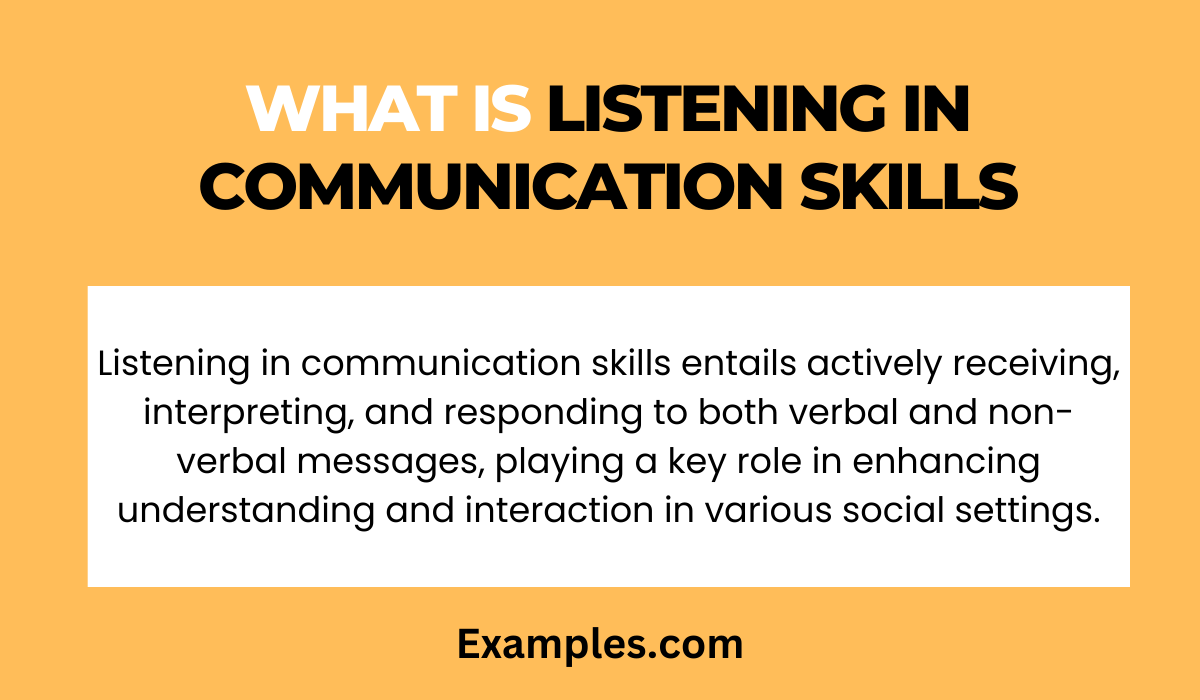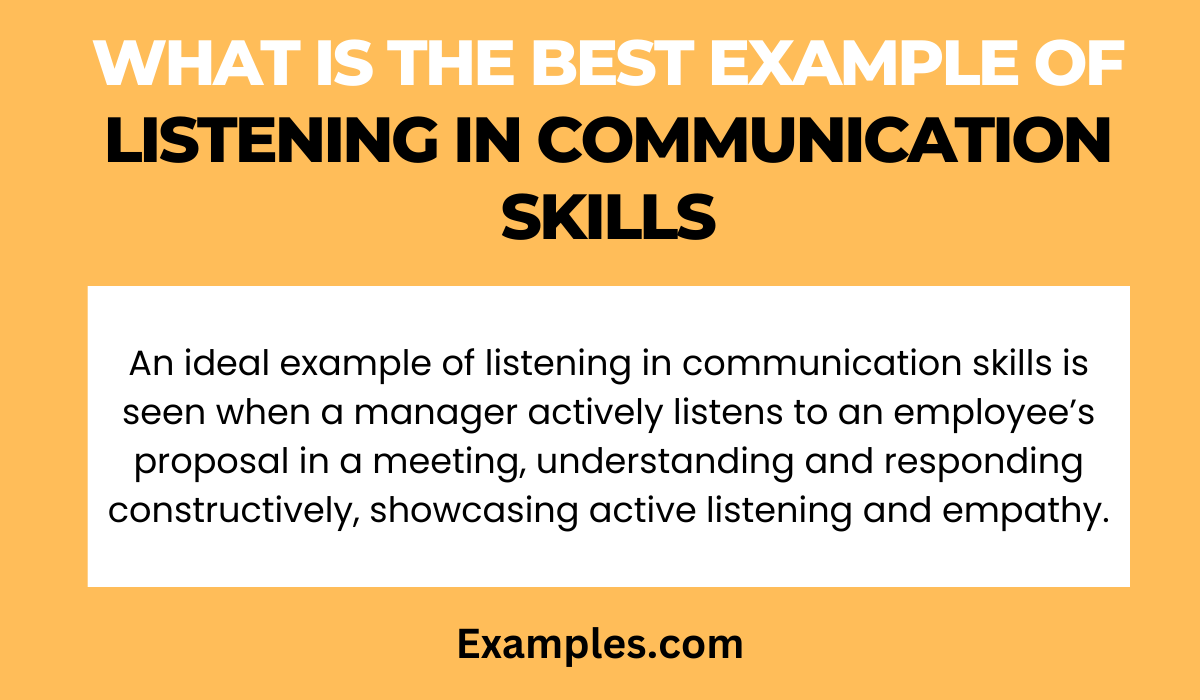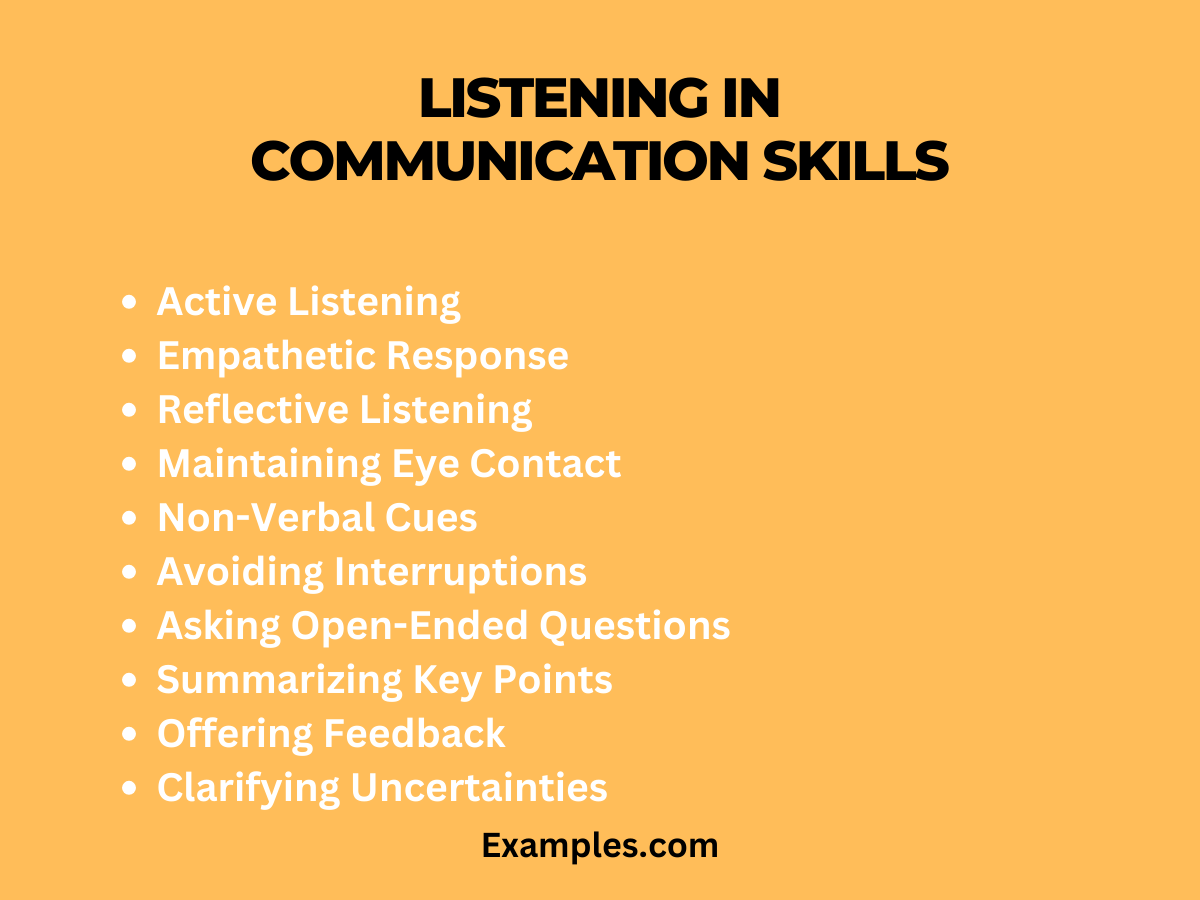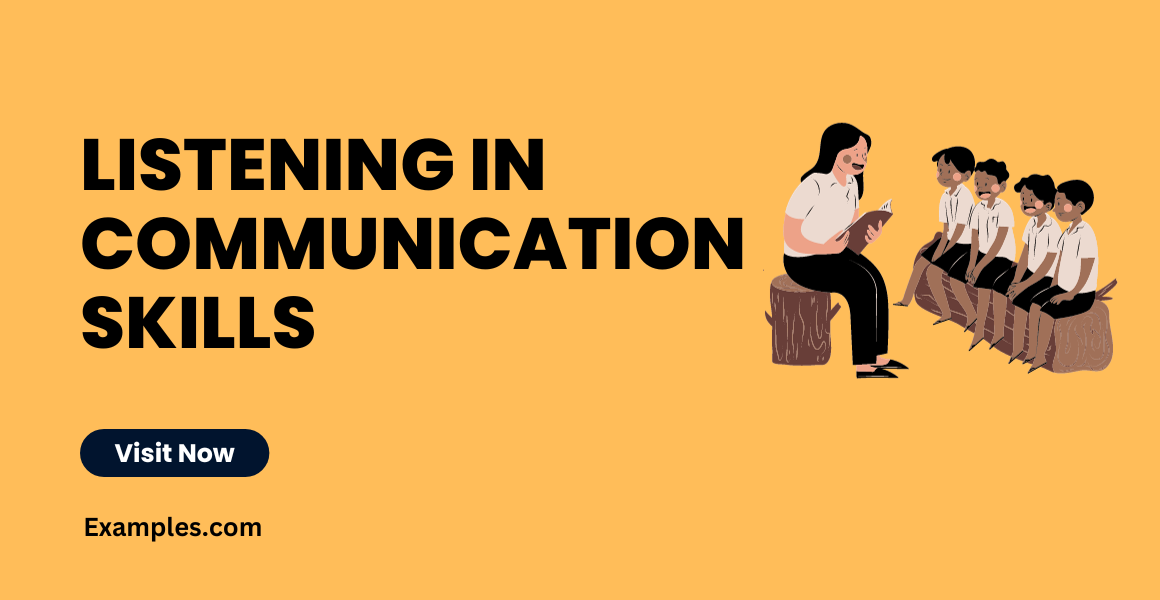29+ Listening in Communication Skills Examples
In today’s fast-paced world, effective Listening in Communication Skills are more crucial than ever. This comprehensive guide, enriched with practical communication examples, delves into the art of listening actively and empathetically. From professional settings to personal relationships, mastering these skills is key to successful interactions. Through real-world scenarios and tips, you’ll learn how to enhance your listening abilities, fostering better understanding and stronger connections.
What is Listening in Communication Skills?
Listening in communication skills is the process of attentively receiving, interpreting, and responding to verbal and non-verbal messages from others. It is a crucial component of effective communication, where the listener actively engages with the speaker, beyond just hearing the words. This skill involves understanding the tone, intent, and emotions behind the spoken words, making it integral to both oral communication and interpersonal communication skills. Effective listening leads to better comprehension and more meaningful interactions, playing a key role in communication skills in relationships, communication skills at the workplace, and other social settings.

What is the Best Example of Listening in Communication Skills?
A prime example of listening in communication skills occurs in a scenario where a person not only hears what is being said but also comprehends and reacts appropriately to the speaker’s message. For instance, during a team meeting, a manager actively listens to an employee’s proposal, acknowledges their points, asks relevant questions for clarity, and provides constructive feedback. This illustrates active listening communication skills and demonstrates empathy in communication skills.

30 Listening Communication Skills
Mastering Listening in Communication Skills involves active engagement, empathy, and understanding. This skill is essential for building relationships, resolving conflicts, and enhancing collaboration in personal and professional settings. By practicing effective listening, one can significantly improve communication dynamics, leading to more productive and harmonious interactions.

- Active Listening: Fully engage and focus on the speaker, showing genuine interest.
Example: “I see your point. Can you elaborate on that idea?” - Empathetic Response: Demonstrate understanding and empathy towards the speaker’s feelings.
Example: “I understand that must be frustrating. How can I help?” - Reflective Listening: Paraphrase what you’ve heard to confirm understanding.
Example: “So, what you’re saying is you need more time to complete the project?” - Maintaining Eye Contact: Show attentiveness and respect by keeping eye contact.
Example: “I’m listening, please go on.” - Non-Verbal Cues: Use gestures and facial expressions to show engagement.
Example: Nodding and smiling while the other person speaks. - Avoiding Interruptions: Let the speaker finish before responding.
Example: Waiting patiently, then saying, “Thank you for sharing that.” - Asking Open-Ended Questions: Encourage deeper conversation and understanding.
Example: “What led you to this conclusion?” - Summarizing Key Points: Recap main ideas to show comprehension.
Example: “To summarize, your main concern is…” - Offering Feedback: Provide constructive feedback in a supportive manner.
Example: “I like your idea, have you considered…” - Clarifying Uncertainties: Ask questions to clarify any confusion.
Example: “Could you clarify what you mean by…” - Acknowledging and Validating: Recognize the speaker’s thoughts and feelings.
Example: “I can see why you feel that way.” - Patient Listening: Give the speaker time to express themselves without rushing.
Example: “Take your time, I’m here to listen.” - Adapting to Speaker’s Style: Adjust your listening style to suit the speaker.
Example: Matching the speaker’s pace and tone. - Avoiding Judgment: Listen without forming premature conclusions.
Example: “I’m open to hearing your perspective.” - Encouraging Continuation: Motivate the speaker to share more.
Example: “That’s interesting, tell me more.” - Respecting Silence: Understand the value of pauses in conversation.
Example: Comfortably waiting during a moment of silence. - Noting Non-Verbal Signals: Pay attention to body language and tone.
Example: “Your tone seems to indicate you’re upset.” - Mindful Listening: Stay present and avoid distractions.
Example: “I’m focused solely on what you’re saying.” - Emotional Intelligence: Recognize and respond to emotional cues.
Example: “You seem excited about this, right?” - Respecting Different Perspectives: Appreciate diverse viewpoints.
Example: “I hadn’t considered that angle.” - Expressing Interest: Show curiosity and interest in the topic.
Example: “That’s fascinating, can you explain further?” - Seeking Common Ground: Find areas of agreement to build rapport.
Example: “I agree with your point on…” - Limiting Personal Bias: Keep personal opinions and biases in check.
Example: “I want to understand your view fully.” - Cultural Sensitivity: Be aware of cultural differences in communication.
Example: “I respect your cultural perspective on this.” - Following Up: Show engagement by referencing past conversations.
Example: “Last time we spoke, you mentioned…” - Encouraging Elaboration: Prompt further details for clarity.
Example: “Can you give me an example of that?” - Being Open-Minded: Welcome new ideas and perspectives.
Example: “That’s an interesting approach, tell me more.” - Balancing Speaking and Listening: Ensure a two-way conversation.
Example: “Now, I’d like to share my thoughts.” - Remembering Key Details: Demonstrate attention by recalling specifics.
Example: “I remember you mentioned that before.” - Offering Support: Show readiness to help or provide assistance.
Example: “How can I support you in this?”
Importance of Listening in Communication Skills
Listening is a cornerstone in effective communication, enhancing mutual understanding and building stronger relationships. It’s not just about hearing words; it’s about comprehending, empathizing, and responding appropriately. Mastering listening skills is crucial for personal growth, professional success, and maintaining healthy relationships. It plays a pivotal role in empathy in communication skills, communication skills at the workplace, and interpersonal communication skills.
- Enhances Mutual Understanding: Effective listening is essential for understanding the speaker’s perspective, crucial for effective communication and resolving misunderstandings.
- Strengthens Relationships: Attentive listening fosters deeper, more empathetic connections, particularly significant in communication skills in relationships.
- Improves Learning and Comprehension: In educational settings, active listening aids in better understanding and retention of information, vital for communication skills for students.
- Facilitates Problem-Solving: By fully understanding issues, listening contributes to more effective problem-solving, especially in communication skills at the workplace.
- Boosts Leadership Quality: Leaders who listen effectively are better equipped to inspire and lead, a key aspect of communication skills in leadership.
- Enhances Emotional Intelligence: Listening attentively to emotions conveyed in communication improves emotional intelligence, integral to emotional intelligence in communication skills.
- Promotes Effective Decision-Making: Understanding all viewpoints through listening aids in making informed decisions, crucial in oral communication.
- Builds Trust and Credibility: Active listening establishes trust and credibility, essential in all forms of interpersonal communication skills.
- Encourages Openness and Collaboration: Listening fosters an environment of openness and collaboration, important in collaboration in communication skills.
- Improves Customer Relations: In business, understanding customer needs through listening is key to satisfaction and loyalty, a part of communication skills for business.
Role of Listening in Communication Skills
The role of listening in communication skills is pivotal, enhancing understanding and rapport in various interactions. It’s crucial in effective communication, shaping relationships, and contributing to personal and professional growth. This skill is essential for empathy in communication skills, enabling deeper comprehension and effective feedback, thus reinforcing interpersonal communication skills.
- Facilitates Clearer Communication: Good listening ensures accurate reception and comprehension of messages, reducing miscommunication in oral communication.
- Enhances Team Dynamics: Listening is fundamental in teamwork, helping to integrate diverse ideas and facilitating collaboration in communication skills.
- Critical in Conflict Resolution: Active listening helps in understanding all sides of a conflict, vital for importance of conflict resolution in communication skills.
- Supports Effective Negotiation: In negotiations, listening to the other party’s views is crucial for reaching mutually beneficial outcomes, highlighting the importance of negotiation in communication skills.
- Aids Personal Development: Listening to feedback and insights aids in self-improvement, a key aspect of emotional intelligence in communication skills.
- Promotes Inclusivity and Diversity: By listening to diverse perspectives, it encourages inclusivity, important in interpersonal communication skills.
- Enhances Customer Service Skills: Attentive listening to customers’ needs and feedback improves service quality, essential in communication skills for business.
- Supports Effective Teaching and Coaching: Teachers and coaches who listen effectively can better understand and address their students’ needs, a part of communication skills of a teacher.
- Improves Public Speaking: Listening to audience feedback and reactions helps refine public speaking skills, important for communication skills for public speaking.
- Facilitates Adaptability and Flexibility: Active listening helps in adapting to new situations and understanding changing dynamics, key in communication skills at the workplace.
How to Improve Your Listening Skills in Effective Communication
Enhancing listening skills is crucial for effective communication. It involves developing the ability to attentively hear, understand, and respond appropriately in various interactions. Improving listening skills strengthens relationships, enhances learning, and improves workplace efficiency. It’s a vital component of communication skills, influencing emotional intelligence, and fostering better interpersonal relationships.
1. Prioritize Mindful Listening
Enhance listening in communication skills by practicing mindful listening. This involves being fully present in conversations, eliminating distractions. Mindful listening not only improves communication skills at the workplace but also in personal interactions. By focusing entirely on the speaker, you acknowledge their importance and foster more meaningful connections.
2. Develop Empathy
Empathy is a cornerstone of effective communication. By putting yourself in the speaker’s shoes, you deepen your understanding of their perspective. This empathetic approach is especially beneficial in communication skills for couples, where understanding each other’s emotions is key. Empathetic listening leads to stronger, more compassionate relationships.
3. Engage in Active Listening
Active listening is vital in communication skills in relationships. It involves not just hearing words but also understanding the message behind them. In oral communication, active listening includes acknowledging the speaker, asking clarifying questions, and providing appropriate feedback, thereby enhancing the overall communication experience.
4. Observe Non-Verbal Cues
Paying attention to non-verbal signals enhances listening communication skills. Body language, facial expressions, and tone of voice provide crucial information beyond words. In interpersonal communication skills, being attuned to these non-verbal cues can reveal unspoken feelings or thoughts, leading to a deeper understanding.
5. Practice Reflective Listening
Reflective listening is a technique that improves communication skills in nursing and other empathetic professions. This method involves paraphrasing or summarizing what the speaker has said to show that you’ve understood them. It’s a powerful tool in active listening communication skills, ensuring that both parties are on the same page.
6. Avoid Interrupting
Interrupting can hinder effective communication. Allowing the speaker to finish their thoughts without interruption is a sign of respect and is crucial in communication skills for students and professionals alike. Patiently listening and responding appropriately enhances understanding and demonstrates good listening in communication skills.
7. Ask Open-Ended Questions
Open-ended questions are key in listening for problem solving. These questions encourage the speaker to provide more information and express themselves more freely. In communication skills training, learning to ask such questions can lead to more productive and insightful conversations.
8. Give Constructive Feedback
Feedback is an integral part of communication skills in leadership. Offering constructive feedback in a supportive manner shows that you’ve listened and understood the message. This skill is also crucial in communication skills for team building, where it can foster a positive and collaborative environment.
9. Adapt to the Speaker’s Style
Adapting to the speaker’s style is important in cultural sensitivity in communication. This involves adjusting your listening approach to align with the speaker’s communication style, which is particularly relevant in communication skills for business and multicultural settings. By doing so, you demonstrate respect and openness to diverse perspectives.
10. Continuous Practice and Feedback
Consistent practice is key to mastering listening in communication skills. Regularly engaging in situations that require active listening helps in honing this skill. Seeking feedback on your listening abilities, especially in communication skills for young adults, can provide valuable insights for improvement. This ongoing process ensures continuous development of your listening capabilities.
Tips for Listening Skills in Communication
1. Embrace Active Engagement
Engage Fully in Conversations: For effective listening in communication skills, it’s crucial to fully engage in the conversation. This means giving undivided attention to the speaker, which is a cornerstone of active listening communication skills. Avoid distractions, and show your engagement through eye contact and affirmative nods, demonstrating your commitment to the conversation.
2. Understand Non-Verbal Communication
Interpreting Body Language: A significant part of listening involves reading non-verbal cues. Observing the speaker’s body language, facial expressions, and gestures enhances your understanding of their message, an integral aspect of interpersonal communication skills. This skill is particularly useful in communication skills at the workplace, where non-verbal cues can be as informative as verbal communication.
3. Show Empathy and Understanding
Connect on an Emotional Level: Empathy is a powerful tool in listening. By showing understanding and compassion towards the speaker’s feelings, you foster a deeper connection. This empathetic approach is vital in communication skills for couples and communication skills in relationships, where emotional understanding can greatly enhance the quality of interactions.
4. Encourage Open Communication
Ask Open-Ended Questions: Encouraging the speaker to elaborate on their thoughts is a key technique in effective communication. By asking open-ended questions, you invite more detailed responses, facilitating a richer dialogue. This approach is especially beneficial in communication skills for students, helping them express their ideas more freely and confidently.
5. Practice Reflective Listening
Rephrase to Confirm Understanding: Reflective listening is a technique where you paraphrase the speaker’s words. This not only shows that you are listening but also helps clarify and confirm your understanding. In communication skills training, this approach is emphasized as it ensures that both parties are on the same page.
6. Be Patient and Avoid Interruptions
Give Time to the Speaker: Patience is essential in listening. Allowing the speaker to finish their thoughts without interrupting them shows respect and ensures you get the complete message. This is particularly important in communication skills for parents and communication skills in nursing, where giving time to speak can be both respectful and informative.
7. Provide Constructive Feedback
Engage with Positive Feedback: Offering thoughtful feedback is an essential component of active listening. It not only shows that you are engaged but also contributes to the conversation’s progress. In communication skills at the workplace, constructive feedback can foster a collaborative and supportive environment.
8. Clarify and Seek Understanding
Ask Questions to Clarify: To avoid misunderstandings in listening, don’t hesitate to ask for clarification on points you’re uncertain about. This is a key aspect of communication skills in leadership, ensuring that all team members are aligned and understand each other clearly.
9. Respect Different Perspectives
Appreciate Diverse Viewpoints: Respecting and acknowledging different perspectives is crucial in listening. This openness enhances interpersonal communication skills and is particularly important in diverse settings like communication skills for team development, where multiple viewpoints can lead to more innovative solutions.
10. Balance the Conversation
Ensure Equal Participation: Effective listening involves balancing speaking and listening. This ensures that communication is a two-way process, essential in communication skills in marriage and communication skills for family, where every member’s voice is important for healthy interactions.
Honing listening skills is vital for effective communication. This guide offers practical tips to improve listening, fostering better understanding, empathy, and connectivity. Whether in personal relationships, the workplace, or educational settings, applying these techniques can significantly enhance communication dynamics, leading to more meaningful and productive interactions.



